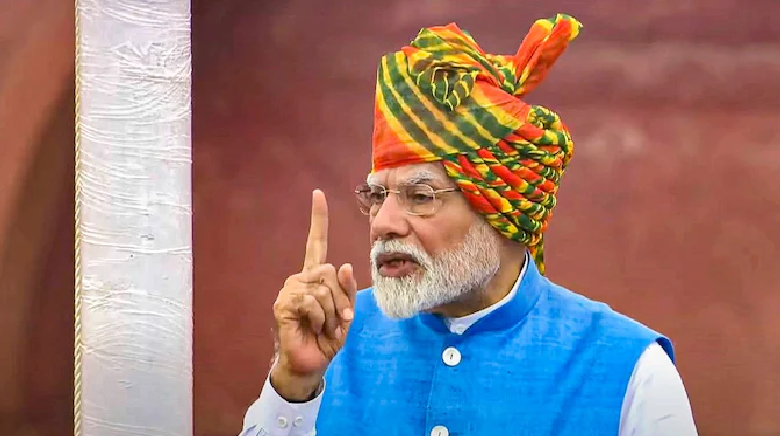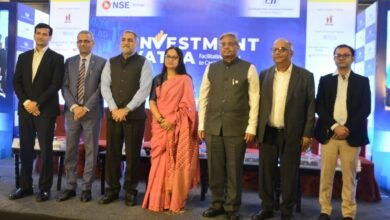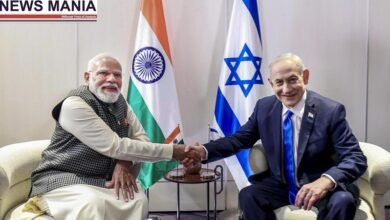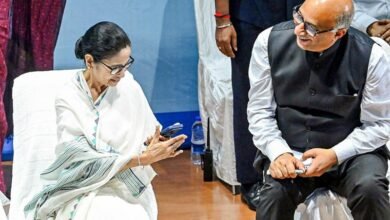PM Modi Advocates for Secular Civil Code and Viksit Bharat in 78th Independence Day Speech

News Mania Desk/Agnibeena Ghosh/15th August 2024
In his 78th Independence Day address from the Red Fort, Prime Minister Narendra Modi delivered a powerful and far-reaching speech that underscored his vision for India’s future. Asserting the need for a uniform civil code, PM Modi made a compelling argument for replacing the existing “communal” code with what he termed a “secular civil code.” His speech marked the third term’s first Independence Day address and his 11th consecutive one, reflecting his sustained leadership of the nation.
During the 98-minute address, his longest Independence Day speech to date, PM Modi also strongly advocated for the concept of “one nation, one election,” pushing for simultaneous elections across the country. This proposal aims to streamline the electoral process, reduce costs, and ensure greater stability in governance. By emphasizing the need for a uniform civil code and a unified election process, PM Modi aimed to position these initiatives as pivotal steps toward realizing a “Viksit Bharat” (Developed India) by 2047.
The Prime Minister’s speech painted an optimistic picture of India entering its “golden era,” with aspirations of becoming a developed nation within the next 23 years. He also reiterated his commitment to eliminating casteism and nepotism from Indian politics, highlighting the importance of meritocracy and inclusivity. PM Modi called for one lakh young individuals with no family ties to politics to enter public life, believing that fresh perspectives and new mindsets are crucial for enriching the democratic fabric of the nation.
However, the Prime Minister’s speech did not go without criticism. Opposition leaders expressed dissatisfaction with the address, labeling it as uninspiring and divisive. D Raja, the general secretary of the Communist Party of India, voiced his concerns that PM Modi’s speech failed to present unifying themes that could inspire and unite the nation. Raja argued that the Prime Minister’s remarks aligned with what he described as the divisive agenda of the RSS, neglecting to celebrate the country’s diversity and plurality. He also criticized the Prime Minister for not addressing pressing issues like the allegations raised by the Hindenburg Research report, which questioned the integrity of various Indian institutions.
Annie Raja, general secretary of the National Federation of Indian Women (NFIW) and a CPI leader, joined the chorus of disapproval, particularly questioning the practicality of the “one nation, one election” concept. She expressed skepticism about the government’s ability to manage such an ambitious initiative, especially in the context of ensuring free and fair elections. Annie Raja’s critique extended to the broader vision of making India an economic superpower by 2047, arguing that the government’s priorities might be misplaced.
Rashtriya Janata Dal leader Manoj Jha also criticized PM Modi’s approach, accusing him of failing to acknowledge that he is the Prime Minister of all Indians, including those who did not vote for him. Jha expressed disappointment that PM Modi’s vision for a secular civil code seemed to lack genuine commitment to the principles of secularism. He further argued that the Prime Minister’s rhetoric often fell short of the inclusive leadership expected of a national leader, stating that the speech reflected a narrow, rather than broad-minded, approach.
Despite the criticism, PM Modi’s address highlighted his vision for India’s future—a vision that seeks to bring about significant changes in the country’s social and political landscape. As India moves forward, the debate surrounding these proposed reforms is likely to continue, shaping the nation’s trajectory toward the “Viksit Bharat” that the Prime Minister envisions.






